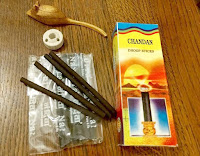Continuing both my current interest in dhoop sticks, and my eBay shop, I bought a selection of dhoop sticks wholesale from Popat Stores. The dhoop sticks have sold well, and I would like to continue to sell dhoop on eBay using the same page, though I am closing the shop itself, as it costs £25 a month to keep it open, and I don't list enough to justify that. The shop is a hobby rather than a business, and at the moment is running at a loss (though that is partly due to the mistakes I keep making!). The dhoops are marketed by Haria Trading Co. (HTC) of Mumbai, who also sell agarbatti. I'm not entirely sure that HTC make the incense themselves as some boxes contain dhoop sticks wrapped in bags marked Nandita, an incense company also based in Mumbai.
Added in 2023: Haria also trade as Haria Perfumery Works, which led me to their proper website, which does explain that they make the incense themselves, and have been doing so since 1968. It also provides more proof for what I have been saying for years, that Indian incense makers don't use halmaddi for it's scent, but for its binding qualities, and how it carries the scent of the fragrant ingredients.
These dhoop sticks look oily and wet, but are in fact quite dry. I'm not keen on wet dhoops as they are quite smoky and sharp, usually because of the oil or fat content, generally from the traditional ghee ingredient, and are clearly intended to be used mainly for ritual purposes. Dry dhoops, however, are more pleasant to burn. One of my favourites incenses, that I always keep in stock, is Panchavati - thin reddish coloured dhoop sticks. Dry dhoops are similar in style to Japanese incense, and also to Tibetan, though the Tibetan incense tends to be made mainly for spiritual and health reasons, and as such is not as aesthetically pleasing as Japanese and Indian dhoop. [Added 2025: Haria dhoops are perfume-dipped rather than proper dhoop]
There is a pleasant, though not profound, sweet sandalwood aroma on the stick. It's interestingly jammy and floral with suggestions of leather and patchouli. Very likeable. When burning there are some sharp smoky notes that intrude. It's still a pleasant incense, though the ingredients are not necessarily of high or consistent quality as they do allow for some of those off tones. When compared to the Vaastu Sandal I reviewed recently, we all preferred the Vaastu, though there wasn't much in it.
Date: Nov 2018 Score: 30
These dhoop sticks look oily and wet, but are in fact quite dry. I'm not keen on wet dhoops as they are quite smoky and sharp, usually because of the oil or fat content, generally from the traditional ghee ingredient, and are clearly intended to be used mainly for ritual purposes. Dry dhoops, however, are more pleasant to burn. One of my favourites incenses, that I always keep in stock, is Panchavati - thin reddish coloured dhoop sticks. Dry dhoops are similar in style to Japanese incense, and also to Tibetan, though the Tibetan incense tends to be made mainly for spiritual and health reasons, and as such is not as aesthetically pleasing as Japanese and Indian dhoop. [Added 2025: Haria dhoops are perfume-dipped rather than proper dhoop]
There is a pleasant, though not profound, sweet sandalwood aroma on the stick. It's interestingly jammy and floral with suggestions of leather and patchouli. Very likeable. When burning there are some sharp smoky notes that intrude. It's still a pleasant incense, though the ingredients are not necessarily of high or consistent quality as they do allow for some of those off tones. When compared to the Vaastu Sandal I reviewed recently, we all preferred the Vaastu, though there wasn't much in it.
Date: Nov 2018 Score: 30
***
 |
| Dhoop |




No comments:
Post a Comment
Please leave a comment: